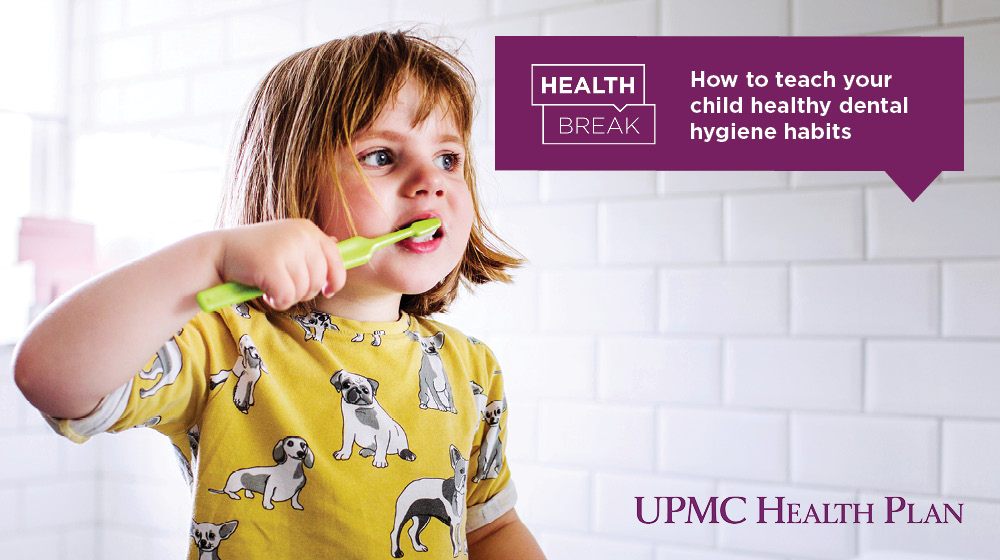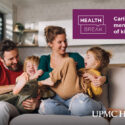Health Break: How to teach your child healthy dental hygiene habits

A podcast for UPMC Health Plan members, Health Break is your quick guide to caring for your mental and physical health, prioritizing wellness, and making the most of your health insurance plan.
Episode 4: Take a Health Break with Barb and Alaina
Alaina Stango and Barb Hammerschmitt take a Health Break to share tips and strategies for building healthy oral health habits with the kids in your life.
Episode transcript:
Camille: Welcome to Health Break by UPMC Health Plan, your quick guide to health, wellness, and how to make the most of your health insurance plan. Listen during your coffee break, lunch break, or anytime you need a break. I’m your host, Dr. Camille Clarke-Smith. I help to oversee the quality of the plans we offer at UPMC Health Plan.
Alex: And I’m your co-host, Alex Treanor. I’m a senior health coach who works with our members on healthy lifestyle habits and goals. This is your… Health Break.
Alex:Hey everyone! I’m Alex Treanor. Today we’re talking oral health and hygiene with Alaina Stango and Barb Hammerschmitt—specifically, how to create healthy dental health habits with kids.
Thank you so much, Alaina and Barb, for joining us today.
Barb, to get started. Why are dental health and hygiene so important?
Barb: Well, it’s really important to keep our teeth and gums healthy and disease-free because any bacteria— that bad bacteria, infection, or disease that’s in our mouth—can get into our bloodstream and cause overall health issues such as heart disease can have an impact, so it’s really important to keep things healthy. Also, it’s good to be able to keep our natural teeth because they’re important to help us chew. If we can’t chew up our food properly, it can cause digestive problems. And so that’s another good reason to want to have our teeth healthy and pain-free. Also, our teeth help us talk properly and [say] words properly. And everybody likes to have a nice, healthy smile.
Alex: Alaina, in general, what are some dental hygiene habits we should have?
Alaina: The CDC recommends that we drink fluoridated water and brush with fluoridated toothpaste. We recommend brushing your teeth twice each day for about two minutes, and floss once a day. We also recommend going to the dentist twice a year. So just around every six months you should be seeing a dental provider. We want to make sure that people know the appropriate amount of fluoridated toothpaste to use. We encourage children 3 and older through adults to use a pea-sized amount of fluoridated toothpaste, and for children 3 and under, we recommend just a rice-sized smear of fluoridated toothpaste.
Alex: So, Barb, how can we apply these guidelines to kids and create healthy habits for them?
Barb: Well, first of all, as we all know, kids like to imitate the adults. So if we as adults can establish consistent routines and healthy habits at home, then the children will typically want to follow along. Having said that, when we head to the bathroom to brush, it’s, you know, it’s good to brush properly so that the children can see just how we do it. When they’re young and not sure what to do, they may want to chew on their toothbrush or suck on it or sometimes even clean the sink. It is good to just let them play with it really, too, in their mouth and just feel what it feels like, but also then get them to starting to learn the technique of brushing. I always recommend that, you know, let the children do the best they can because the only way they’re going to get good at it is to practice. But then to follow up with a, you know, a thorough inspection or maybe just brush a few areas that you think your child might be missing. That way the teeth are nice and clean.
We do, you know, recommend, at night that should be the very last thing that they put in their mouth is their toothbrush and getting the teeth nice and clean before they head to bed. Also, there’s a lot of gadgets out there now that help make it a little bit more fun if the children are hesitant or not really wanting to brush. They have built-in timers in some of the electric toothbrushes. We do recommend a two-minute period of time for brushing, so that helps them know how long they should brush. And two minutes is a long time, so it really does help give them an idea of really how long they should be brushing. Some of them light up or even [play] music, and just whatever it takes to make it more fun and help the children want to go in their bathroom and brush their teeth.
Alex: Alaina, are there any lifestyle habits that support dental health?
Alaina: Yes, diet affects our teeth and oral cavity as well. We want to make sure that everyone is drinking plain water in between meals. It’s a great way to reduce the risk of cavity from childhood through adulthood. We don’t want anyone sipping on sugary drinks for long periods of time. And we also recommend, you know, for growing children who need energy and fuel, that we’re not having too many snacks, but that we’re making the snacks count. Pairing a carbohydrate with a protein can be really helpful, like apple slices dipped in peanut butter or a handful of berries with some cheese cubes. That’s going to give our children the energy they need and fill up their bellies so that they’re not having too frequent snacks throughout the day. We also think using tools can be a really successful way of encouraging brushing and creating a positive atmosphere around taking care of your teeth.
For some children, a sticker calendar or a sticker chart works really well. It’s very motivating for them to get the sticker on the sheet or onto the calendar after they’ve done their brushing morning and nighttime. And as Barb mentioned, timers can be a really great tool to make sure they’re brushing for the appropriate amount of time. If you don’t have a timer built into your child’s toothbrush, you can use something as simple as an egg timer or the timer on your phone. And the other really fun thing you can do is just play a two- to three-minute song. You can choose your child’s favorite song one night and your favorite song the next and make it fun. But those are great ways to motivate your child and to make toothbrushing and oral hygiene habits positive. And then always we recommend to take your child to the dentist as recommended, twice a year.
Alex: Thank you so much, Alaina and Barb, for taking a Health Break with us today.
Be sure to schedule your routine dental exams not just for the kids in your life, but for yourself as well!
Find show notes and more information at upmchealthplan.com/podcast. Join us as we explore other health and wellness topics in the next episode of Health Break.
This podcast is for informational and educational purposes. It is not medical care or advice. Individuals in need of medical care should consult their personal care provider. Views and opinions expressed by the hosts and guests are solely their own and do not necessarily reflect those of UPMC Health Plan and its employees.
Related to this episode:
About Alaina Stango:

Alaina Stango has more than 12 years of clinical dental hygiene experience working in direct patient care. Presently, she is the public health dental hygiene practitioner (PHDHP) dental care manager administrator for the PHDHP Dental Team, where she assists in program operations. Alaina earned an associate’s degree in dental hygiene from Westmoreland County Community College and a bachelor’s degree in Dental Hygiene Education from the University of Pittsburgh. She is currently receiving her MS in Health Informatics. Alaina has previously presented on ”Maternal, and Infant Oral Health’ and ”Infant Feeding, and Oral Care for the Dental Professional.”
About Barb Hammerschmitt:

Barb Hammerschmitt is a public health dental hygiene practitioner (PHDHP) dental care manager with UPMC for You. She has been in this position since 2017. Prior to that, she worked as a registered dental hygienist in the clinical setting for over 30 years. Barb studied at the University of Pittsburgh, where she earned a certificate in Dental Hygiene, a bachelor’s degree in Health & Related Professions, and a master’s degree in Public Health.
About Dr. Camille Clarke-Smith:

Camille Clarke-Smith, EdD, is a program director in the Quality Improvement, Medicare Stars Department at UPMC Health Plan, where she leads the Medicare Faith and Wellness Program, a 3- to 12-week health and wellness challenge. She is also the founder of the nonprofit Transforming the Health of African American Women (THAW) Inc. She earned a doctorate in health and physical activity education from the University of Pittsburgh in addition to a master’s in exercise science and a bachelor’s in psychology and sociology. She is currently pursuing her master’s degree in social work at Carlow University.
About Alex Treanor:

Alex Treanor is a lead health coach at UPMC Health Plan. As a lifestyle health coach, she specializes in helping you lose weight, eat healthy, get more physical activity, be less stressed, and quit tobacco. Alex has a master’s in Kinesiology, Integrative Wellness from Point Loma Nazarene University. She has been coaching since 2014 and is a Nationally Board Certified Health & Wellness Coach and Certified Personal Trainer. Alex is passionate about helping people improve their relationship with food and exercise while creating healthy, sustainable routines filled with enjoyment. Alex enjoys spending time with her husband, walking with her dog, and eating tacos in the sunshine.



